Treasure Island Pedagogies: Episode 22 - the one with the card game
Posted on: 5 December 2022 by Dr Tunde Varga-Atkins in General
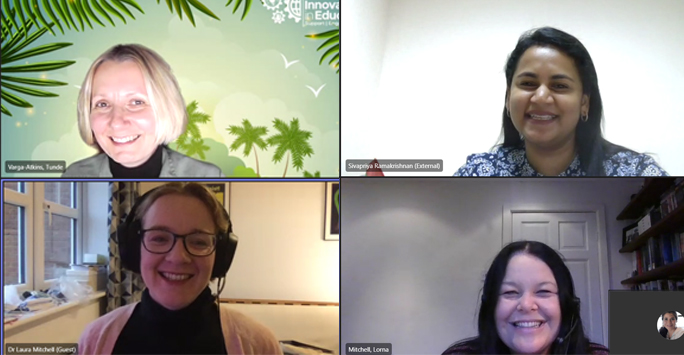
In Episode 22, our lightbulb moments, treasure island pedagogies/props and luxury items, included getting students engaged in cases that use personal connections, storytelling, card games where students can overwrite the rules and taking a course/programme-level approach to formative assessment; coming full circle back to campfires to tell, read and create stories that sustain us.
Speakers: Sivapriya Ramakrishnan, Dr Laura Mitchell & Lorna Mitchell
Date: 21 November 2022
Treasure Island Pedagogies: Episode 22 podcast
(Treasure Island Pedagogies Episode 22 - podcast transcript)
Read or listen to find out our guests’ lightbulb moments, teaching props, pedagogies and luxury items that they would take to their Treasure Islands for precious contact time with students.
Sivapriya Ramakrishnan
Physical Therapy, University of Sharjah, United Arab Emirates
- Original discipline(s): Physical Therapy
- Current role: Lecturer in Physical Therapy
- Lightbulb moment: Storytelling to connect students with real life situations: giving students a picture of the patient, get them to think what has happened to the patients & how to make their life easier; this will connect students to what we are learning. My students get surprised when I approach them for permission to include them as real cases (or those of their families) as part of (anonymised) cases studies in my classroom.
- Teaching prop or pedagogy: Human models for teaching the structures to students.
- Luxury item: An 'office hours' and 'non-office hours' tag on my [island] door to let students know when I am off duty.
Dr Laura Mitchell
England Business ethics, University of York, UK
- Original discipline(s): Organisation Studies & HRM
- Current role: Programme Lead for BA(Hons) Business & Management, module leader for business ethics
- Lightbulb moment: Silence. Students stopped their conversation when I spoke to focus on what I was saying; but I wasn’t sure they were truly learning from that given the gap between my life experiences and their own. My focus is to give students something real but which they can still connect to their prior experiences.
- Teaching prop or pedagogy: Card games to promote active learning through interactions and discussion: they are short and easy to digest. I developed a card game (a blend of Top Trumps and dominoes) to teach argument structure in business ethics.
- Luxury item: A Kindle to be able to read non-academic texts.
Lorna Mitchell
Law, University of Liverpool, UK
- Original discipline(s): Law
- Current role: Lecturer in Law, Academic Enhancement Lead for the Law Department and Deputy Director of Education for the Law Department
- Lightbulb moment: I was thinking about a lightbulb moment for me as a lecturer. I have been reading a lot of assessment literature and had realised that by taking a programmatic approach to formative assessment (not just summative assessment) you solve the problem of focussing simply on assessment support for a particular module and instead start thinking about the learning and study skills that you would like students to develop across the entire programme. I work backwards and think about what I would want students to be able to do by end of year 1, 2 and 3 and introduce progressively challenging tasks to take students on a learning journey. I start with a marking activity to improve their assessment literacy, then I incorporate short form (low risk) self-reflection and peer review exercises to give students plenty of practice and finally I set more complex activities that require students to put all that they have learned so far into practice.
- Teaching prop or pedagogy: Students as co-creators of learning resources: I get students to teach concepts through presentations to other students. I capture students work, using Prezi as an electronic concept map that incorporates student presentation videos, research, comments and materials. Students get very creative and inventive!
- Luxury item: Clay to build decorative mugs & matches to light the fire for my ceramics, which will go well together with our campfire for storytelling.
Any sparks? How might our joined-up Treasure Islands look like?
Increasing student engagement through connecting to real experiences through personal experiences resonated with all three of our guests. We also discussed students’ engagement with formative tasks (as opposed to summative tasks) and what facilitated this, for instance allocating in-class time or breaking down and developing skills that built up to students being able to perform that first summative assessment. Having a competitive, game-element in the class or students acting as co-creators of their learning were also seen to contribute to student engagement, as well as empowering students to 'edit their own curricula' with a pen and paper, or amending their own rules of the game - great examples of inclusive and flexible learning.
Links / resources
From Sivapriya Ramakrishnan
The human models I use in my teaching:
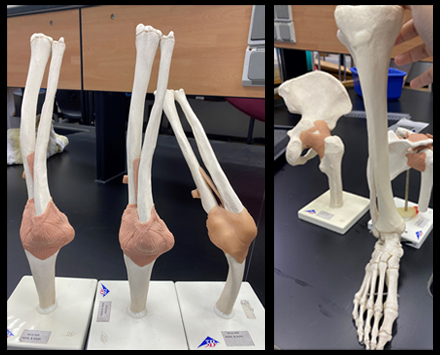
(Fig 1: Human Models of Elbow with Muscle attachments, and Ankle and Foot joint)
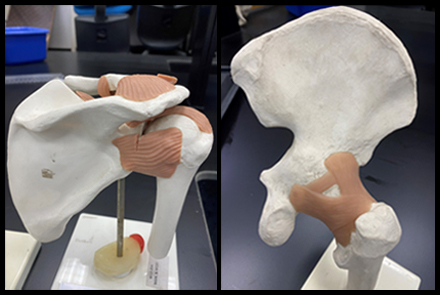
(Fig 2: Human Models of Shoulder and Hip complex with Muscle attachments)
Resources/articles
- Abdulaziz, A., Bashir, M. & Alfalih, A.A. The impact of work-life balance and work overload on teacher’s organizational commitment: do job engagement and perceived organizational support matter. Educ Inf Technol 27, 9641–9663 (2022).
- Atyeh Ashtari, Efadul Huq, Faranak Miraftab. (2022) The joy of many stories: Zine-making and story-mapping in planning pedagogy. Planning Practice and Research 0:0, pages 1-18.
- Davidson, N., McKeen, R., & Eisenberg, T. (1973). Curriculum Construction with student input. The Mathematics Teacher, 66(3), 271–275.
From Laura Mitchell
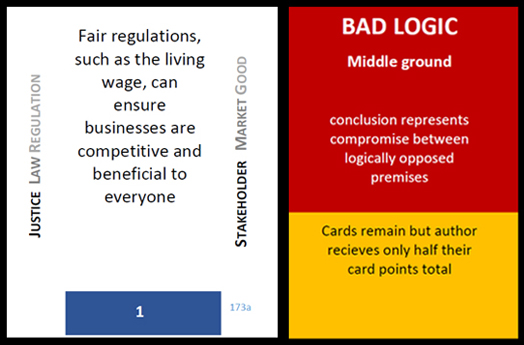
(Premise and Bad Logic Cards for the Bad Logic card game on business ethics by Laura Mitchell)
- BAD LOGIC, a card game about creating a logical argument to answer the question 'What are the responsibilities of Business?'.
- Bad Logic How to Play Instructions.
- Files to print your own cards on A4 paper or light card (Deck of Cards [pdf], Deck of Cards [word doc]). You may wish to use card sleeves if printing on paper to mimic a deck of cards.
From Lorna Mitchell
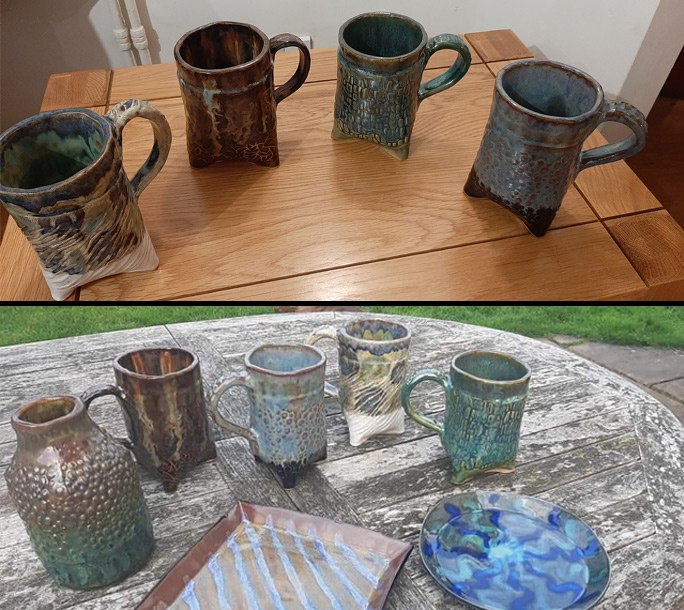
(Mugs and plates made by Lorna Mitchell)
- Irons, A. and Elkington, S. (2022) Enhancing Learning through Formative Assessment and Feedback. Milton Park, Abingdon, Oxon; New York, NY: Routledge.
Facilitated by Dr Tünde Varga-Atkins, Sound: Chris Loxham/Sandra Samaca, Web design: Dennis Wong, @LivUniCIE
Keywords: Treasure Island Pedagogies, Podcast, Innovation, Education, Interdisciplinary, Formative Assessment, Peer Learning, Card Games, Students as Creators, Engagement.